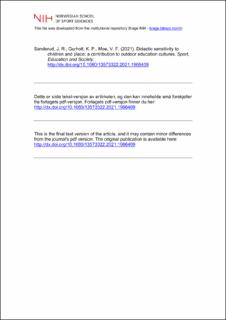Didactic sensitivity to children and place: a contribution to outdoor education cultures
Peer reviewed, Journal article
Accepted version
Permanent lenke
https://hdl.handle.net/11250/3049128Utgivelsesdato
2021Metadata
Vis full innførselSamlinger
- Artikler / Articles [2119]
- Publikasjoner fra Cristin [1107]
Sammendrag
There is a tendency in European education policy to emphasise more and better deliberate learning outcomes. The tendency is criticised for taking an instrumental view of education [Biesta, G. (2010). Good education in an age of measurement: Ethics, politics, democracy. Routledge,; van Manen, M. (2008). Pedagogical sensitivity and teachers practical knowing-in-action. Peking University Education Review, 6(1), 2–20. http://www.maxvanmanen.com/files/2011/04/2008-Pedagogical-Sensitivity-Teachers-Practical-Knowing-in-Action.pdf] and threatening children’s self-governed play opportunities [Pettersvold, M., & Østrem, S. (2019). Problembarna: Metoder og manualer i barnehage, skole og barnevern. Cappelen Damm akademisk]. However, self-governed play outdoors is perceived as educationally important, notably within Nordic early childhood education. This paper aims to contribute to the international debate on what constitutes good education by investigating an outdoor education culture framed within the context of Nordic early childhood education. We investigate the research question of what characterises teachers’ outdoor didactics in self-governed play and growth as these appear in a Norwegian nature kindergarten? The theoretical framework builds on (1) perspectives on Bildung as playful self-formation [Løvlie, L. (2002). The promise of bildung. Journal of Philosophy of Education, 36(3), 467–486. https://doi.org/10.1111/1467-9752.00288; Steinsholt, K. (2010). Vi må miste oss selv for å finne oss selv igjen. Lek, erfaring og danning hos Hans-Georg Gadamer. In K. Steinsholt, & K. P. Gurholt (Eds.), Aktive liv (pp. 101–119). Tapir Akademiske Forlag] and (2) a relational perspective on children’s self-governed outdoor play as a way of integrated dwelling and growth through intimate correspondence with environments [Ingold, T. (2000). The perception of the environment: Essays in livelihood, dwelling and skill. Routledge, (2018). Anthropology and/as education: Anthropology, art, architecture and design. Routledge]. Data were generated through ethnographic fieldwork in a public Norwegian nature kindergarten that emphasises children’s outdoor play as educationally important. Nineteen children aged 4–6 participated. The fieldwork drew on participant observation, including playing with the children and on-site conversations. Using the theoretical framework as a lens, the educational culture is conceptualised as didactic sensitivity, which entails the teachers’ delicate sensitivity and responsiveness towards children and place. The teachers act professionally by creating unique, thoughtful, responsive, and situated conditions for children’s autonomous growth in natural environments.
Beskrivelse
Dette er siste tekst-versjon av artikkelen, og den kan inneholde små forskjeller fra forlagets pdf-versjon. Forlagets pdf-versjon finner du her: tandfonline.com / This is the final text version of the article, and it may contain minor differences from the journal's pdf version. The original publication is available here: tandfonline.com
